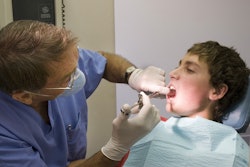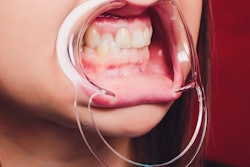
Dental Dose is a new twice-monthly video series featuring pharmacologist Tom Viola, RPh. In each episode, Viola shares bite-sized pieces of dental pharmacology news, facts, and myths.
Chances are, articaine is the local anesthetic of choice in your office. But how well do you know the ever-popular agent? In this episode of Dental Dose, Tom Viola shares three articaine myths that might confuse even the most experienced dentist.
"The fact that articaine works so well is really its claim to fame," Viola said. "But other parts about articaine are a little confusing for folks."
Myth 1: Articaine works like an ester, so it's safe for patients with an amide allergy.
One of the benefits of articaine is that it's an amide that's metabolized like an ester. This means articaine is largely broken down in the bloodstream, so patients don't need to have good liver function to use it, Viola said.
But while articaine may be metabolized like an ester, chemically, it's still an amide. As a result, it's not safe for the rare patient with a true amide allergy.
"If a patient has a true amide allergy, in my opinion, I would send them off to their doctor to see which amide they can use safely," Viola said. "They may be a good prospect for general anesthesia at that point."
Myth 2: Articaine is not ideal for patients with sulfa allergies.
Articaine is renowned for its ability to penetrate quickly and deeply thanks to its incredible fat-soluble properties, Viola explained. That's because it contains a sulfur atom in the ring that makes up the central part of the molecule.
"A lot of people get confused because they hear sulfur, and they think, 'Ah, that means I can't give it to someone with a sulfa allergy,' " Voila said, shaking his head. "Not the same thing."
Sulfur, the atom, is entirely different from a sulfa allergy, he said. That's why articaine can be given to patients with a sulfa allergy -- but not to those with an amide allergy.
Myth 3: Articaine is OK for people with sulfite sensitivity.
To make things even more confusing, articaine can cause problems in patients with a sulfite allergy or sensitivity. That's because it's only packaged with epinephrine, which is preserved with sulfites.
"Since articaine is only available with epinephrine, you can't give that person articaine," Viola said.
Instead, he recommends using an anesthetic that's not packaged with epinephrine for someone with a sulfite allergy or sensitivity.
"So to recap, you can give articaine safely to someone with a sulfa allergy, but you can't give articaine safely to someone with an amide allergy or a sulfite allergy," Viola said.
Watch the full episode below to learn more about articaine, including why it's a good choice for patients with compromised liver function.
Do you have a topic idea for Dental Dose? We'd love to hear it: Please share your thoughts with the team.



















